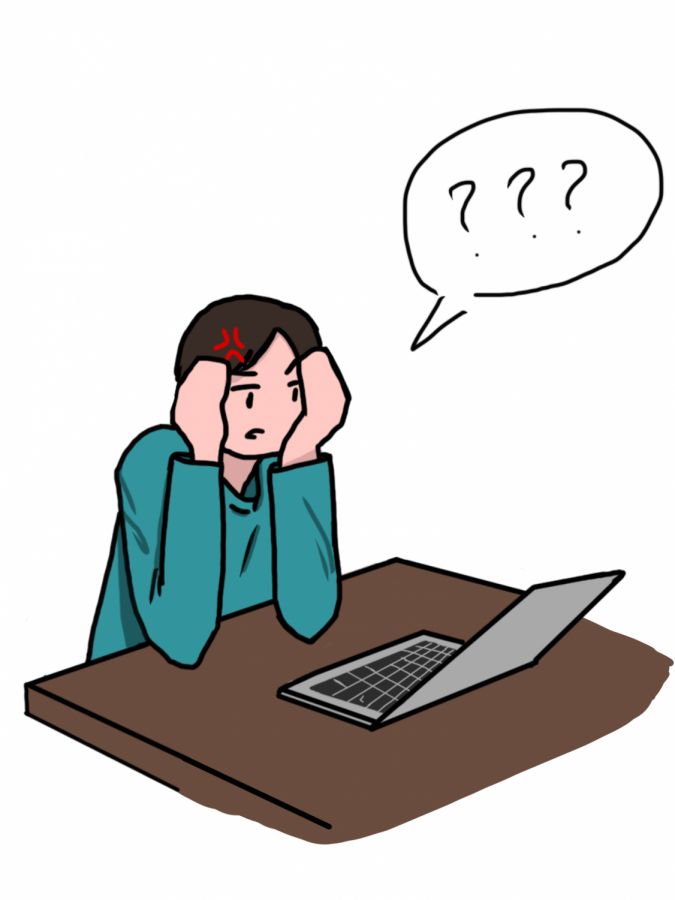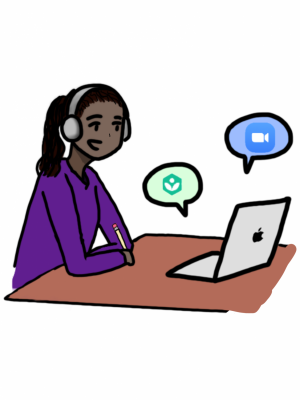Online school is a blanket policy that doesn’t help students
Graphic Courtesy of Graphics section
During COVID-19, parents have had both their parenting and working lives face dramatic changes.
June 3, 2020
When the COVID-19 quarantine started to stretch on from its initial two-week span, MCPS launched a distance learning system where teachers would assign work to be completed by students at home. May 12th also saw the launch pass/fail grading system for the fourth quarter, changing the grading format to help students achieve during this pandemic.
Given that every student is different, it is almost impossible to provide adequate instruction for all students using blanket policies and lessons such as those seen in MCPS. There is no way to replicate the setting of a classroom, both in the focus-conducive environment, or the ability for teachers to help students learn in an individualized way.
One place this deterioration is seen is in the value of assigned work. Some teachers seem to have given up on meaningful teaching and instead assign busywork. This is just giving students things to do that do not end up educating the students at all.
The other option teachers take is to assign actual work through a slideshow or a pre-recorded lesson. They then expect their students to absorb the information as though they were in class. Overall, the inadequate actions of teachers are just an effect of a county-wide policy that seemingly ignores the obvious limitations of distance learning.
It is hard to learn at home for some students. In school, everything is planned out to help students achieve academically and rid their environment of distractions. Students at home do not have the same privilege. Many have household responsibilities such as cooking, cleaning, or caring for siblings while childcare facilities remain closed.
Almost every student also has access to their phone, computer, gaming console, or even just the outdoors. In a Tide article about the popularity of TikTok, students noted how they were sometimes unable to complete their homework due to the almost addictive draw of the app. The issue with distance learning is that this draw is compounded.
Without an appropriate working environment, the allure of social media frequently distracts students from work. This helps to explain how many students find the information hard to absorb. Even with meaningful work being assigned, it can be difficult to learn and retain the information that they are being sent.
The new grading policy presents its own issues, with inflation being the most problematic. Currently, if a student passes fourth quarter, their semester grade can either be marked as one letter grade higher than their third quarter grade or simply as a pass. The effect of this is county-wide grade inflation. Students who can bump up their grades if they wish since the letter grades still factor into cumulative grade-point average, while those who are unsatisfied can take a pass, which does not impact GPA. This prevents equal treatment of all students and artificially creates higher grades.
Earning these grades is also called into question, considering that distance learning does not work. Students that receive a pass still may not understand the content they had supposedly learned, and this has whole hosts of long-term repercussions, such as preparedness and applications for college credit.
Overall, the MCPS response to the COVID-19 pandemic, while flawed, is understandable. Nobody was prepared for the lengths of time that have to be spent in quarantine, and just as we are adapting to our new lives at home, MCPS is adapting to teaching students who are unable to attend school.
That being said, one clear road that would’ve been better was to end the school year, as occurred in Washington DC. If that course of action had been taken, all students would kept on the same level of understanding. While it may require teaching review in the coming years, to cover potentially missed information, it also ensures that all students are on the same playing field.
Currently, students who understand their work, for whom distance learning is not an issue, can progress, but those who do not are tethered to the levels of knowledge they had before leaving school. If future classes are taught with the presumption that students learned things during quarantine, those same students are likely to have a much harder time learning and keeping up with their peers.
It is fundamentally unfair to punish students who are unable to learn at home due to outside factors, and as such, it is unfair to continue distance learning with the expectation that students will be able to grow and progress from it. At the very least, MCPS should be looking to institute curriculum- and county-wide review when school begins next year, to ensure that all students can pick back up from where they left off, and grow to be better learners.



